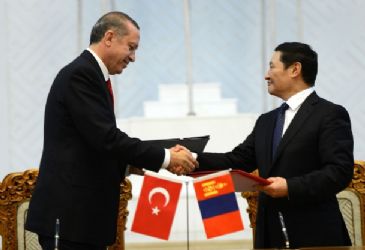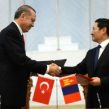
Turkish Prime Minister’s Visit to Mongolia
Publication: Eurasia Daily Monitor Volume: 10 Issue: 88
By:

Turkish Prime Minister Recep Tayyip Erdogan’s visit to Mongolia last month (April 11–12) is likely to result in closer bilateral economic cooperation in addition to the two countries’ already well-established cultural, educational and security ties. As is traditional for Turkish high-level guests to Mongolia, Prime Minister Erdogan visited the Tonyukuk monuments near the capital city. He also opened the Konya Cultural Center and Mosque and attended the opening ceremony of Ankara Boulevard in Ulaanbaatar (Ministry of Foreign Affairs of Mongolia, Press Release, April 12). During Erdogan’s visit, both sides agreed to increase the number of direct commercial flights between Istanbul and Ulaanbaatar (with a stop-over in Bishkek, Kyrgyzstan), to implement a reciprocal visa exemption (within 30 days) policy, as well as to expand their cooperation in construction (i.e., housing and highways), leather processing and tourism (Joint Statement, April 18). The visit and resulting set of agreements demonstrates Ulaanbaatar’s desire to expand its bilateral relations with Ankara—which it regards as one of Mongolia’s most important “third neighbors” that can support its commitment toward democracy and development.
Even though both countries had recognized one another in 1969, Mongolian-Turkish bilateral relations were essentially non-existent until the end of the Cold War. Following Mongolia’s political and economic liberalization, relations developed gradually in several areas—particularly in politics, security, culture and education. The exchange of high-ranking dignitaries, including presidents, prime ministers, and parliamentary speakers, has become normalized. Resident ambassadors were posted in 1996–1997. These concrete government-to-government contacts opened up the possibilities for reciprocal political support between the two countries in the international arena. Illustratively, Turkish support was instrumental in bringing Mongolia into the post–Cold War international system, which is largely dominated by developed democracies. The most recent example of this was Turkey’s political support for Mongolia’s full accession to the Organization for Security and Cooperation in Europe (OSCE) in 2012 (https://www.osce.org/cio/97372).
Closely related to their bilateral political cooperation, Turkey also provides significant assistance to Mongolia’s military and police forces. Since 2003, the two countries have institutionalized their defense cooperation through various joint agreements. Today, both militaries carry out annual high-ranking military exchanges, staff talks, peacekeeping/counter-terrorism exercises, and military training and educational assistance programs. Since 2000, 70 Mongolian military personnel (Author’s interview with Mongolian Ministry of Defense, April 18) and 42 police officers graduated from various Turkish military and police academies; 36 Mongolian police officers are currently training in Turkey. Additionally, 332 Mongolian police personnel attended various short-term training courses in Turkey since 1997 (Embassy of Mongolia in Ankara—Press Release, December 22, 2012). The Mongolian police forces had been in dire need of Western-style training and education because Western states provide less educational assistance for local law enforcement forces than the military. Consequently, Turkey is one of the greatest contributors to Mongolian police reform and education.
Moreover, as one of the largest land force contributors to the North Atlantic Treaty Organization (NATO), Turkey is a vital source of knowledge for the Mongolian military as it seeks to adopt NATO operational and training standards. Turkey was one of the key supporters, along with Belgium, Luxemburg and Germany, of including Mongolia in NATO’s Partnership for Peace (PfP) program (Author’s interviews, Ulaanbaatar, June, 2010). Lately, Turkey has also played a supporting role for Mongolia to become a partner in NATO missions across the globe, and in 2012, Ulaanbaatar signed the Individual Partnership and Cooperation Program with the Alliance (https://www.nato.int/cps/en/natolive/news_85430.htm). Today, Mongolia is a force provider for the NATO-led mission in Afghanistan; therefore, there is an operational need for Mongolia and Turkey to collaborate more often.
Perhaps the most readily apparent connection between Mongolia and Turkey is a shared cultural history. Many monuments recovered in Mongolia attract Turkish visitors due to their mutual significance for both nations. Among the best known include the monuments in memory of Gokturk Empire rulers Bilge Kagan (684–734 CE) and his brother Kul Tigin (684–731), located near Kharkhorin, the capital of the 13th-century Mongolian Empire. Likewise, the monument to Tonyukuk, a military and political figure of the Gokturk Empire, located near Ulaanbaatar, similarly annually draws tourists from Turkey (Today’s Zaman, April 22). To help preserve this common heritage, since 1994, The Turkish Cooperation and Developmental Agency (TIKA) provided over $30 million of assistance for various projects to preserve and to study the historical Mongolian monuments that are also linked to Turkey’s past (Turkish Foreign Ministry—Background Notes on Bilateral Relations).
While this shared cultural heritage contributes to warm bilateral relations, Turkish assistance and cooperation in the area of education has played the most critical role in bringing understanding and awareness between the two distinct societies (notably, unlike Turkey’s majority Sunni Muslim population, Mongolia is dominated by a Buddhist and shamanistic culture, albeit a small percentage of the population is Muslim). In 1994, During Mongolia’s early period of transition from a Soviet-style educational system to a Western-oriented one, Turkish educational entrepreneurs opened several high schools that offer a Western-standard educational curriculum in English as well as Mongolian and Turkish. Although Soviet-run secondary schools were considered the most prestigious high schools in Mongolia during the Communist period, Turkish high schools in Ulaanbaatar, Darkhan-Uul province and Bayan-Olgii province have today become among the most valued high schools in the country. Over 3,000 Mongolian children have graduated from the Turkish high schools and pursued advanced degrees abroad, in Turkey and in English-speaking countries. As recorded by various sources, about 1,000 Mongolian students are currently enrolled in undergraduate and graduate training programs in Turkey; and many of them receive scholarships from the Turkish government (Today’s Zaman, April 22).
Due to geographic distance, economic cooperation between the two countries is low. Bilateral trade is less than $40 million and is lopsided in favor of Turkish exports. Recent talks between high-level dignitaries and joint economic commissions, however, revealed a desire to expand economic cooperation in housing development, highway projects, leather processing and tourism by the Mongolian side, as well as in the energy sector by the Turkish side. But unresolved trade-related complexities stand in the way of closer economic cooperation except in tourism (www.president.mn/mongolian/node/3296; www.parliament.mn/news/categories/83/pages/4683). Indeed, the planned increase of daily flights between Istanbul and Ulaanbaatar may allow both countries’ respective populations to discover the wonders of Inner Asia and Asia Minor. Though, a more robust trade relationship will be difficult to achieve quickly. Still, Ulaanbaatar recognizes that Turkish support and recognition of Mongolia’s commitment to democracy, development, and international peace and security is vital to gain better access to those regional organizations where Turkey maintains strong profile.




